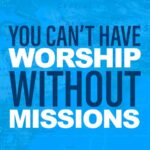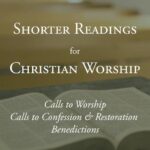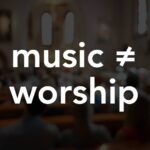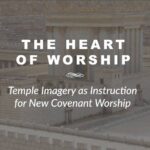I recorded this episode of the Better Together Podcast, the official podcast of the Executive Office of the National Association of Free Will Baptists, with Dr. Eddie Moody, Executive Secretary. You can listen and view this at the YouTube link below.
Planning a Worship Service
Eddie Moody: 01:09
So, you’ve had a lot of experience working with worship as a pastor and so forth. So, tell us, how does one go through picking out songs, planning a worship service?
Daniel Webster: 01:27
Yeah, well as of course, I was a full time music director at Gateway Church; then I was a pastor still coordinating the worship. And then now I’m still leading worship at Immanuel Church here in Gallatin. So I think probably maybe one of the first steps that needs to be taken; I think there’s a lot of confusion in the church, as to who the “worship leader” is.
We toss that phrase around; sometimes we just look at the 20-year-old kid who’s not ordained; maybe he’s working at the community college on a music degree or something like that. We say, “Hey, you’re the worship leader.” I still am kind of old fashioned; I still prefer to view the ordained men of the church as the ones who lead the worship. This doesn’t deemphasize musicians; it’s a call for musicians to seek out ordination and that type of thing.
So, that’s kind of big picture now. But I think a pastor needs to establish with his church, his musicians, who the worship leader is. And you may have someone else who coordinates the events of the worship throughout the week; then you may have a song leader, who gets up and leads the songs. And so practically, week to week, you have a clear repertoire: This is what our church sings. “These are the songs that we think have theologically sound content, and promote good doctrine here among our people. And perhaps it’s important for the musicians to have the arrangements in advance; they’re able to play those things without, messing up them. And I could go on; you just tell me when to stop.
Selecting Songs for Church Music
Eddie Moody: 03:47
Well, so. So what you’re saying is that the ordain folks are looking at planning out a worship service. It sounds like you’re involving the musicians, they’re making sure people are practicing. Let’s talk a bit about how you select the songs that you’re going to be singing; how you select what you lay out for a worship service.
Daniel Webster: 04:11
Yes, so I did a presentation this past year at the National on how to choose songs from worship. I think sometimes we choose songs that maybe the church up the road sings and we really like those. So we want to be just like the church up the road, they’re having a lot of success. Or maybe we choose songs that we think will draw a crowd. Maybe we heard a song on the radio. Maybe we choose songs just because our grandparents sang them; that may be on the other side of the spectrum. Or maybe we choose a song because it is in the hymnal.
So, we say well, this song is in the hymnal, so it must be a great song for us. But I think those motivations for choosing songs can sometimes be frail. That’s putting it nicely. So, I’ve suggested a few questions: Do my song choices glorify God and edify the body? Do they teach Christian doctrine? Promote Christian unity? Place emphasis on content? Promote excellent art? Give voice to the congregation?
I’m okay if we disagree on the specific songs that get chosen. What I want folks to consider their motivation for why they’re picking them in the first place. Sometimes we pick songs 10 minutes before the service starts. That happens, too. But I’d like to think in an ideal world that the ordain men are working together with the musicians to select hymns and songs, songs that have been sung in ages past and newly written, music that’s theologically sound that teaches Christian doctrine. We see that in Colossians.
Eddie Moody: 06:34
So, if we’re going to do that, we’re going to have to do it more than six minutes for service. So it’s really, what we would be doing is the pastor and the worship leader, they’re sitting down and maybe looking at, okay, this is what we’ll be preaching from this particular month, this is what we’ll be looking at maybe over the next couple of weeks, and picking songs based on that. Asking the particular questions there and so forth, and laying out a schedule and so forth.
A Sample Worship Service
Eddie Moody:
So, lay out a service like that for us, what might a sample one look like?
Daniel Webster: 07:16
At our church, we do something a little crazy, we actually have the sermon in the middle of the worship service. So I like to view the worship service as not just the song service, sometimes we say “worship leader” and we really mean a “song leader.” Sometimes we say “worship service” and we really mean a “song service.” So I would view all aspects of worship—the preaching, the teaching, the singing the ordinances, baptism and giving—it’s all the worship service.
So at our church, we actually sing and we do scripture reading, we usually sing three songs and have a call to worship and a scripture reading and prayer. And then our pastor comes for the message. And then after he preaches, we’ll then go into a song of response with another scripture reading and a couple more songs with giving, and then announcements at the very end, and then whatever ordinances that we may be doing that week, we do that at the end of the service.
Eddie Moody: 08:22
Okay. So, in other words, you’re trying to have a good flow to everything, getting people focused upon the Lord through your singing through your scripture reading, through the message, and then you’re trying to carry that on.
Stewardship of Worship in Church Music
Eddie Moody:
So the announcements are at the end. Tell us a bit about that.
Daniel Webster: 08:45
At one of the previous churches, where I ministered, we were having trouble ending on time. And so I had my guys up in the media booth to literally write down every time a different element of the worship service started. So, like we started a song at 11:01 choir saying until 11:04…
And what we found is that between congregational singing, giving, scripture reading and those things, there was very little of that in the worship service. And that a lot of the time was just taken up with either transitions, or maybe people breaking the ice and giving some announcements, they just kind of ramble on and those kind of things.
So we worked to eliminate those things. Because when it comes to planning worship, you become a steward of the 60 minutes—or the maybe you might have 80 or 90 minutes in some churches. And so saying we just don’t have time for a lot of extra junk. We really want the best things in our worship service and so really, it’s a matter of stewardship. With anything and so yeah, I think if you could do things like put announcements at the end.
Also a lot of times, if you have a lot of different people coming back and forth they all feel like they need to kind of insert a little joke or kind of break the ice and chitchat with the crowd. And so, as much of that as you can eliminate. That way you leave time for singing, and the things that God actually commands us to do, sing, pray read scripture, preach, and those things.
Eddie Moody: 10:30
So it sounds like you’re saying, we really need to do our best. We’re honoring and glorifying the Lord, we’re trying to do things with excellence. And, so, if we’ve really thought things through how long something thinks we’re able to, or takes, we’re able to focus on the most important things, the announcements, they’re often in a bulletin, or on social media, so it’s what time is left. But the main time we spend on preaching the word singing the word and so forth.
Call to Worship, Scripture Reading, and Congregational Repertoire
Eddie Moody:
So, tell us how you guys kind of worked this out, as you come together to try to plan your service. You talked about the questions you asked about the particular songs and so forth. How do you guys how do you make this happen operationally, so we’re not six minutes before service, trying to pick things out and so forth?
Daniel Webster: 11:24
Yeah. So, when it comes to things like a call to worship, I just personally have my grab bag. I have about 150 calls to worship that I have personally sat down and dug through the Psalms and all of Scripture. And so I have selections that I pull from in terms of the call to worship, and for scripture readings and things like that. And if I know our pastor is preaching a certain section, and those are all things…
Which my situation is a little different, because I am ordained. And so where I would challenge a lot of churches to work closely with the ordained leadership in their church. I am ordained. So sometimes I break the rules, because, my pastor has given me a really long leash that, again, that maybe a 20-year-old guy may not get it.
So I have calls to worship and scripture readings, and I don’t generally just pull songs out of thin air in terms of new congregational songs, I usually = bounce it off my pastor and a couple of the other guys in the church and just say, “Hey, what do you think about this song?” What do you think about this particular key that I’m thinking about doing it in?” I want to select a song that is singable for the congregation. “Hey, I was thinking about the key of F, or maybe the key of G, what do you guys think? What’s better for the congregation on this song?”
And so I’ll bounce it off a couple people and get their input. And so I generally tend to work from a repertoire list, I have a spreadsheet where I have a list of songs that I’ve already spoken with the leadership of the church and I have my pool of songs that I’m choosing from each week.
Church Music Resources for Congregational Songs
Eddie Moody: 13:21
So, let’s talk about that for a bit. So we’ve got folks out there trying to figure out how to do this. Are there resources, where could they go to find this set of songs for call to worship and Scripture reading and so forth? What do you suggest for them?
Daniel Webster: 13:37
Yeah, so well, for starters, that’s what the hymnbook used to. The hymnbook used to be your cannon, if you will, it was your standard, its songs we sand were kept in this hymnbook. And that’s why each kind tradition has had its own hymnbook. And for churches in last couple decades, there isn’t a standard anymore, because there’s no hymnbook.
Eddie Moody: 14:02
A lot of people still would have the rejoice hymnbook. And so you would find within that scripture readings, you would find sometimes where they put a couple of different scriptures together, but you would also find songs associated with that. So that would be a good source. For that there’s a there are other hymn books as well, but that’s one they could purchase from Randall House. So hymnbooks are a good place to come up with that. Where else would you suggest?
Daniel Webster: 14:32
So I have a few outlets that I go to and I tend to think in terms of where I can also get music for my musicians. You need an arrangement for your musicians to be able to pull from. So, I think a big goto is SongSelect which accompanies your CCLI membership, and you can get it where the keys are transposable and things like that. And so that’s very helpful. There’s also places like Getty Music and PraiseCharts and Lifeway Worship that makes music available for musicians.
There’s also a couple of places where music or sheet music is free. So, everything I’ve just said, just now costs money. But Sovereign Grace and Indelible Grace, our church uses a couple of songs from those places, and so their music is free. There’s various outlets for getting music and for having songs for congregational worship.
Congregational Music for Instrumentalists
Eddie Moody: 15:43
So I’ve got a flutist or a high school kid or whatever, playing a particular instrument, I could go to some of those outlets and I could have music for them to incorporate them into the worship service as well? I can look at the Rejoice hymn book or maybe some other hymn books and find ways to try to tie together scripture reading in particular songs and so forth?
Daniel Webster:
Absolutely
Introducing New Songs to the Congregation
Eddie Moody: 16:07
One other thing you mentioned was a new song. So I’m trying to introduce a new song we talked about, hey, what key would this be and how do you introduce a new song to your congregation? What are some good practices for that?
Daniel Webster: 16:22
Yeah, I think sometimes you can teach them a new song, without their ever knowing it. So during say, the prelude, it’s being played, five minutes for the service right before you begin the service. So they’re hearing the tune… And then you could also have it played for the offering. You might make the words available while it’s being played for the offering. And then, after a reversal to the instrumentalists playing that you can have a soloist say, come up and sing it, so that the congregation can hear it.
Something our church does, if we have found a song that we are going to add it to our list of songs that we think, so this song is going to last the test of time, and it’s going to be around for a while, and it teaches the right kind of doctrine, it’s singable and it’s a good marriage of tune and text… we’ll make it a song of the month and we’ll sing it four times that month, every service for four or five weeks straight.
Another option, ne thing that I do with CTS, with our kids music competition, I try to select rather than selecting songs that the congregation already knows, and thus the kids already now I try to really challenge the kids to learn that song. And then they’re going to teach it to the adults. So now I can use that song. Let the children introduce it to the adults, maybe have them do it as an offertory, or as a special music, or something like that. Ask the adults to join in. But I’m actually choosing a song in advance that I know I’m going to eventually use. My own children, they sand “Across the Lands,” that’s a Getty song, and I knew I wanted that as a congregational song. So my kids learned it, they did it for competition, then we gradually have now introduced it to our congregation.
Coordinating Congregational Singing with the Pastor’s Sermon
Eddie Moody: 18:27
How tightly do you tie in songs and scripture reading to the sermon?
Daniel Webster: 18:34
That’s tough. Sometimes it can be almost forced, or really pulling Scripture out of context. My general practice has been a song or two and the scripture reading, that’s it, basically right before the message. So, it may be that within the first half of the song service—and notice I said, “song service” because it’s the song portion of the worship service—so about within the first half of the song service, it may not necessarily tie in directly to the sermon, but definitely the second half tried to begin making a transition to the sermon and again
With our format, we do the sermon in the middle, kind of sandwiched between the two sections of songs or so, I don’t know that you can just make every song, especially if you’re going through a series. I mean, let’s say your series for the month is on grace. You just start wearing out every little song about grace. That you can possibly think of and say you got to pace yourself.
Eddie Moody: 19:39
You do and it’s almost like you’re hitting different areas. So how close would you tie that in? Or do you tie that into a song kind of going back to the flow trying to make things work together? How do you go about that?
Daniel Webster: 20:00
Our pastor recently preached through Colossians. And so, what we did, is when after he preached through a portion of the text, the following week, we would use that same text as a scripture reading. And so it was almost like a reminder. So now it’s the third week of a series we’re reading last week’s text. And it was a reminder, that’s what we covered last week in the message. And then he came and he continued on in the book.
But I think if you sit down and you’re creative, and you obviously have the Spirit’s leading, if your main goal is to teach God’s people through songs, hymns and spiritual songs—to teach and admonish them through music—if that’s your motivation, then I think that things start to fall in place and come up with ideas.
Worship Ministry as Discipleship Ministry
Eddie Moody: 21:05
It definitely requires a lot of planning, preparation. I guess, maybe, a lot of times, folks will do it on a weekly basis, but perhaps could even be done on a monthly basis in some of our churches where people would come together. But it would also be a way of teaching, depending upon the church, depending upon where you might be, but you could have all kinds of people that do various stages in their Christian walk, and they learn a lot about why we do what we do. And they even probably make worship, the songs the scripture reading the sermon more, brings them more in tune to what’s happening, I suspect.
Daniel Webster: 21:49
Yeah. Something I’ve said recently is that, we tend to view music as worship ministry. But if we’re doing it, as Paul commands us in Colossians and Ephesians, music is actually discipleship ministry as well. Paul specifically tells us that music should teach and admonish, and we are to sing to one another in psalms, hymns and spiritual songs, and so on. Whether you’re a new Christian or an old Christian, and whether you are involved in the actual worship planning or the leading through instruments or singing or whether you’re the one in the pew, every aspect of it should be discipleship ministry as much as it is worship ministry.
Eddie Moody:
Well, thank you for sharing this with us.







